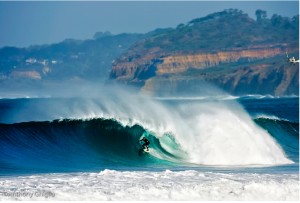 In my first year of teaching at USD, one of my students came in 50 minutes late to a 55 minute class, with wet hair and sandy flip-flops. He came up to me afterwards and apologized for his late arrival and asked if he could take the quiz he missed, saying that the surf had been so amazing that morning that he couldn’t possibly leave the beach to make it to campus in time for class. Perhaps thinking it might help his case, he began to use theological language, fumbling a bit with his description:
In my first year of teaching at USD, one of my students came in 50 minutes late to a 55 minute class, with wet hair and sandy flip-flops. He came up to me afterwards and apologized for his late arrival and asked if he could take the quiz he missed, saying that the surf had been so amazing that morning that he couldn’t possibly leave the beach to make it to campus in time for class. Perhaps thinking it might help his case, he began to use theological language, fumbling a bit with his description:
“Dr. RB, it was like, it was like I was in touch with the Sacred. It would have been a Sin to leave!”
While I didn’t let the student take the missed quiz, we had a long conversation about sacramental theology and religious experience. He confessed that he had never had a religious experience in church, but that the closest he had come to something like a religious experience was surfing, which for him included experiences of watching, waiting, patience, communion with nature, letting go, self-acceptance, appreciation of beauty, and a general feeling of being in touch with a reality bigger than himself.
I’ve told that story a few times in the classroom since, and I find that much of that description resonates with students as they begin to understand sacramentality in the Catholic theological tradition. Before I introduce the seven sacraments in my Catholic theology class, we discuss sacramentality. I note that St. Augustine once defined sacramentum as “a sign of a sacred reality,” and that according to scholar Joseph Martos, Augustine noted that “according to this general definition anything in the world could be considered a sacrament since all of creation was a sign of God.” (Martos, Doors to the Sacred, 4). Martos goes on to explain that ritual gestures, special garments, or objects revered are sacramental when they “point to or symbolize something beyond themselves–something mysterious, something which cannot be seen, something special.” (5). Mircea Eliade calls these religious experiences “hierophanies.” (For an in depth treatment, see Eliade’s The Sacred and the Profane). Martos explains:
A hierophany, then, is a manifestation of the sacred, an experienced revelation of the holy. Having such an experience is like entering into another dimension of space and time, and discovering a whole new world of meaning. The space is sacred space, the time is sacred time, the meaning is sacred meaning. Whether or not it is objectively an experience of another dimension of reality–a transcendent dimension–is an open question. But the experience as a human experience is objectively real. (7).
Martos goes on to quote Paul Tillich:
“Any object or event is sacramental in which the transcendent is perceived to be present. Sacramental objects are holy objects, laden with divine power.”
All of this came rushing into my consciousness Sunday night at a Nada Surf concert in San Diego. The concert venue, The Irenic, is a neighborhood music venue inside an historical North Park church. The cross, which hangs for Sunday worship services, was pulled up to the ceiling so as not to obscure the light show for the rock concert.
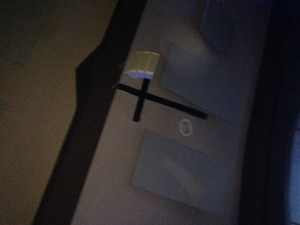 But experiencing this concert in a space used for worship highlighted for me how live music shows often help me to experience God, much like my student confessing an experience of the Sacred while surfing.
But experiencing this concert in a space used for worship highlighted for me how live music shows often help me to experience God, much like my student confessing an experience of the Sacred while surfing.
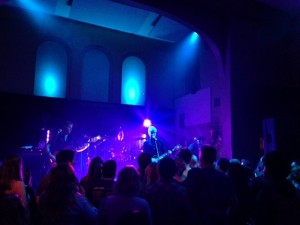
As we enter the season of summer music festivals, I think it is worth reflecting on the power of live music shows to help us get in touch with what it means to be people who can recognize grace in many different kinds of events. Grace, God’s free gift of love, is not only experienced in cathedrals and pilgrimage sites, but can also be experienced in a beautiful sunrise, reconciliation between family members, a protest against police brutality, or even a sweaty summer music festival. Christian Scharen, in his book Broken Hallelujahs: Why Popular Music Matters to Those Seeking God, shows that in our contemporary context there is much Christians can learn from engaging with popular music and culture. I think that the more we are comfortable in talking about our experiences of sacred encounters in ordinary places (like rock concerts), the better equipped we will be to talk to young people about their experiences of the sacred, both in and out of church settings.
A few features of live music shows stand out for me: communion amongst strangers, peace with my body, and the power of music to communicate emotions: joy, loss, loneliness, etc. While not all shows are equally effective in these categories, a good show is one that creates a feeling of solidarity among strangers, helps me appreciate the goodness of my embodiment, and honors human creativity as a process of meaning-making and sharing of human emotions and values (through lyrics, music, lights, images, etc). These create the conditions through which a concert-goer can experience a sense of openness to beauty, and a sense that we have encountered something beyond ourselves.
Communion Amongst Strangers: Going to a live show is very different from listening to an album in the privacy of my car on my way home from work. The most obvious way is that I expect that I won’t be the only one there. Other fans have paid money to see this performance, and we stand around listening to the house music waiting for the show. I only know the friends who came with me. The rest of these people are strangers. But what we have in common is that we like this particular kind of music, at least enough to have paid for the ticket to be here. When the lead singer comes out, we all cheer together. We respond not only as individuals but as a collective. The house lights go down, the band begins, drums, bass line, guitar, vocals, and this group of strangers is transformed into a mass of people bouncing and swaying on the same beat. There is no choreographer for the audience’s movements, but somehow it happens that in responding to the same performance, we respond in similar ways. I don’t know what to call it exactly– unity, communion, solidarity?–among this group of strangers? But I share this experience with those around me, and I am drawn out of myself when I recognize other people’s reactions to the music, other people’s enjoyment of the music. I feel connected to these people. We like the same music. I’m not alone. These are my people. I don’t know their names, but they don’t feel like strangers anymore. A good show can create a sense of communion and a shared collective mindset. At its best, this translates to other life experiences. I look around and remind myself that I am not an island. In this journey of life, we are in this thing together.
Peace with My Body: In a culture saturated with marketing that feeds on my insecurities, we need spaces for celebrating the goodness of our bodies. When I’m in the middle of a crowded concert venue, I’m not paying attention to my make-up, or hair color, or my lack of designer clothing. My head is bobbing to the music, my feet are moving, my hips and shoulders are swaying, and it feels good to be in my own skin. I let go of unrealistic expectations for aging without wrinkles, overeating without gaining weight. These are the hips God gave me, so I’m going to sway them. This is the mouth God gave me, so I’m going to sing along. I don’t have to look like anyone else, or dance to please anyone else. I can just be myself and let go and be fully present in this moment. I accept my body, and as I accept my body, I accept myself as embodied. I feel the music inside me, my ears ringing and my heart thumping. I feel alive. I could not experience this music except through my body–and I am at peace with my body.
The Power of Music to Communicate Emotions: As with other art forms, music shapes our imagination by helping us to see reality from another perspective. Some song lyrics affirm our own deepest values, and encourage us to be our best selves. Some songs make us laugh, pointing out the absurdity of everyday life. Some help us to understand loss or loneliness. Other songs make us recognize our privilege, or think in a new way about racism, or social class. Some artists will talk about politics or about social issues explicitly, but even they don’t, we can pay attention to the messages communicated via the performance and music itself. For me, the most grace-filled concert experiences I’ve had made me want to be a better person: to have more empathy, to have more courage, to be more compassionate. All of this happens because an artist worked very hard to make music, to practice his/her craft and to share this creative expression with an audience. My head bobbing and hip swaying communicates my gratitude for the artist’s work, and ultimately my gratitude to a God in whose presence I live and move and breathe and dance. Life would be so boring if meaning were only communicated through the written form, a preacher’s homily, or a professor’s lectures. Live music shows can be teachable/learning moments in that we recognize that truth and beauty are communicated in many different kinds of forms and venues. I think, for example, of how the lyrics of Nada Surf’s “Always Love” harmonize with much of what Pope Francis communicates in Amoris Laetitia:
To make a mountain of your life
Is just a choice
But I never learned enough
To listen to the voice that told me
Always loveHate will get you every time
Always love
Don’t wait til the finish line
All of which brings me back to sacramentality. I think summer music festivals can reflect what Michael Downey calls the “fourth level of sacramentality.” Downey writes:
Because the reality of God is mirrored in the world, all human life, activity, events, and history, as well as nonhuman life, constitute the arena wherein God’s presence may be discerned. God’s grace, the presence and activity of God and the transformation of life which this brings about, is loose in the world. (“Christian Living: The Sacraments and Liturgy,” in The College Student’s Introduction to Theology, 127).
So go on… buy that pass for Summerfest, Bonnaroo, Pitchfork, Lollapalooza, Sasquatch, Osheaga, Firefly, or Panorama… and reflect on whether you discern God’s presence in and through the concert experience. Let’s open our hearts to the God who wants to encounter us not only in church but in the music festival, and to a medium through which we can “enter into another dimension of space and time.”

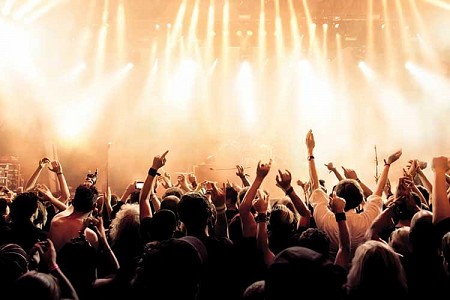
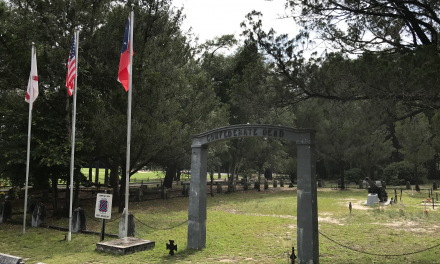

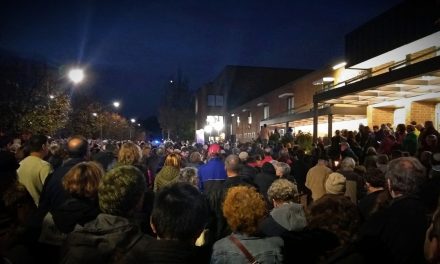
Trackbacks/Pingbacks